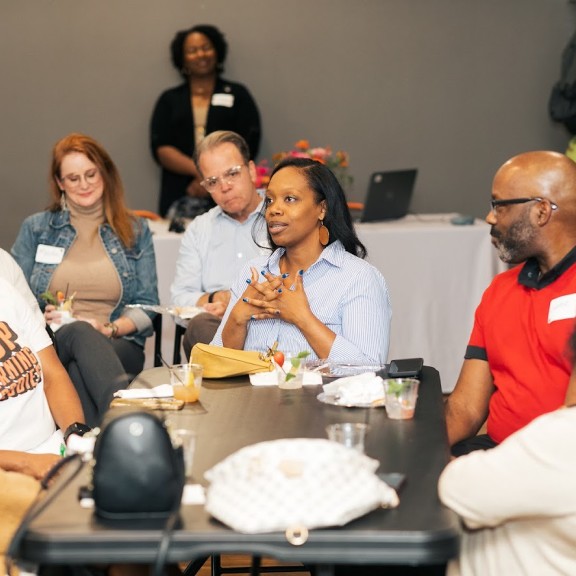Supporting Entrepreneurial Leaders
Across the globe, entrepreneurs and intrapreneurs are advancing the practice of solutions journalism more broadly and quickly than SJN alone could. Through a range of fellowships and cohorts, SJN is increasingly investing in training, coaching and networking support for these founders of news outlets, journalists within established news organizations, and freelancers, as well as providing them with specialized skills to become trainers themselves.
The more you look, the more you realize that [solutions stories] are just out there. They’re just not being reported on.
Cozetta Jones of North Little Rock, Arkansas, speaks during an HBCU Educator / Black Press Academy Fellowship event hosted by Adena White of the podcast “Blackbelt Voices.”
Fellowships & Cohorts
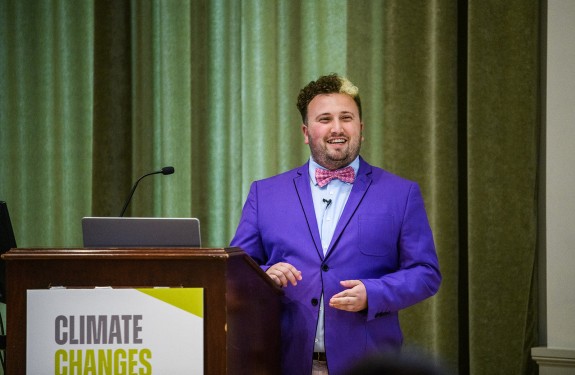
Climate
As the global climate crisis intensifies, journalists are increasingly being challenged to broaden and deepen their coverage of it. This includes a renewed effort to focus on groups whose stories have historically been underreported. Twenty fellows from across the nation participated in SJN’s 2023 Climate Solutions Cohort, honing their expertise in climate-focused solutions journalism and engaging in new ways with communities they cover. Individually and collectively, these journalists worked toward building trust and partnering with their audiences throughout the reporting process.
Pictured: Ethan Brown, founder and host of The Sweaty Penguin, speaks at Climate Changes Everything.
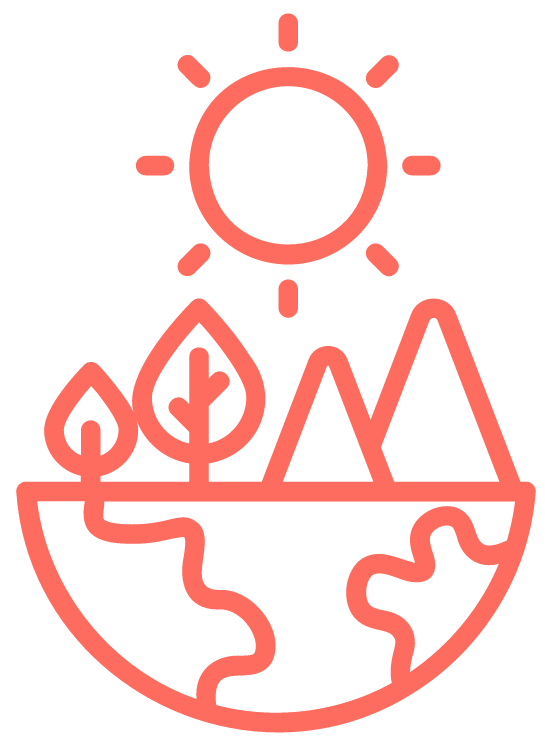
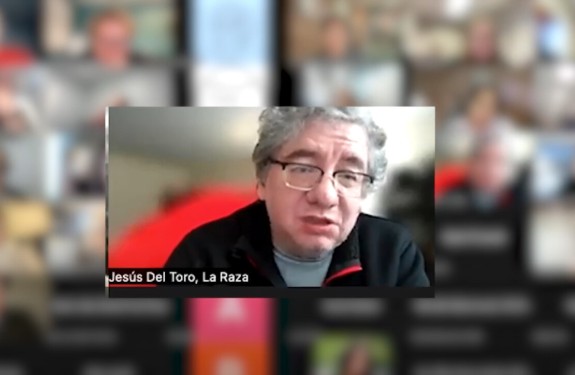
Democracy
Many journalists today are rethinking how best to fulfill the media’s critical role in democracy. In 2023, more than 100 journalists from 20 newsrooms joined the second Advancing Democracy Fellowship, designed by SJN in partnership with Hearken, Trusting News and Good Conflict to support journalists in adopting an alternative to the usual focus on politicians and polls. Over nine months, participating journalists learned — and practiced — skills in solutions journalism, community and audience engagement, trust-building and how to avoid contributing to political polarization.
Pictured: Jesús Del Toro of La Raza speaks during an online workshop.

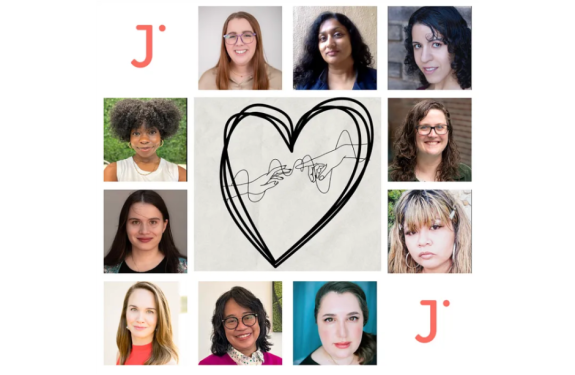
HEAL
Launched in October 2023, SJN’s inaugural class of 10 HEAL Fellows is reporting for and with young people who are facing mental health challenges, and healing through innovative community responses. During their yearlong fellowship, the members of the group will produce stories that:
- (H)elp spread rigorous reporting on what’s working to address mental health issues and inequities;
- (E)xpand young audiences’ access to solutions reporting on issues affecting them;
- (A)ssess the impact of the solutions reporting in the community; and
- (L)earn how to report on and amplify youth mental health solutions.

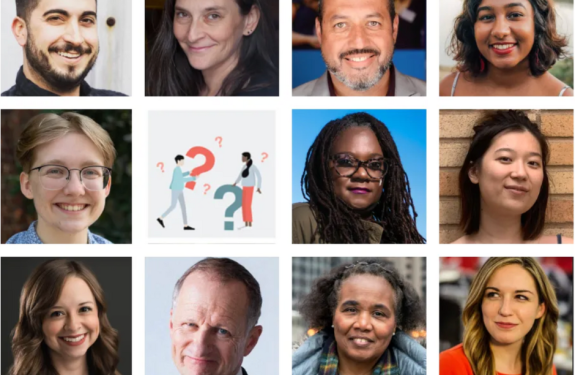
Complicating the Narratives
The yearlong Complicating the Narratives (CTN) Fellowship trains journalists to employ techniques grounded in listening, trust-building and working across divides while investigating promising responses to some of the nation’s most divisive issues. In June 2023, SJN graduated its first cohort of CTN Fellows and selected 11 new fellows for its second iteration. Among others, the fellowship supports journalism entrepreneurs like AfroLA founder Dana Amihere, who is helping create a “better, more nuanced understanding” of the issues Black Los Angelenos face with stories on topics such as an L.A. high school teaching an AP African American Studies course, and opioid recovery treatment for Black women.
Reporter Earned Trust with Deep Listening
While reporting “The Last Chance for Safe Injection Sites?”, a story focused on drug harm reduction in Philadelphia, reporter Rachel Wisniewski faced skepticism and distrust from potential sources whose perspectives were essential to the story. She built relationships, explained her motivation and approach, and used listening and looping techniques aligned with the framework called “Complicating the Narratives.” The result: She earned the trust of people in the community. “I patiently made my intentions clear, answered questions, and invited collaboration,” she said. “In time, my patience and persistence paid off.” A text from the founder of a grassroots harm reduction group affirmed this hard-earned connection: “I know you understand but sorry for coming off guarded when we met. We’ve had real scumbags trying to get pictures and stories for the wrong reasons. I see you now. <3”
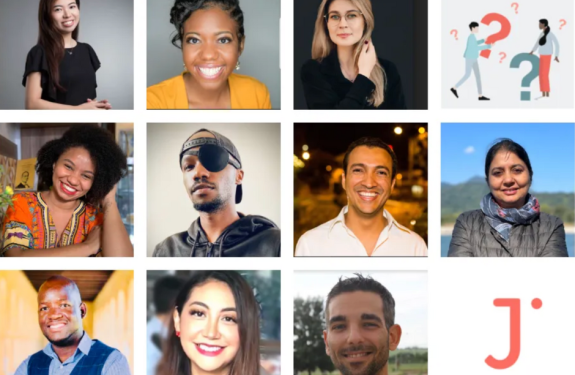
LEDE
From Zimbabwe to Argentina, the 2023 LEDE Fellows (L)everaged their existing audiences’ interests to integrate more solutions journalism into their stories; (E)xpanded their audiences’ access to solutions journalism; (D)isseminated understanding of how to spread access, retain audiences and/or generate revenue via solutions journalism; and (E)liminated barriers to solutions journalism. Geetanjali Krishna, founder and editor of Rohingya Stories, a WhatsApp refugee-focused newsletter, says: “The response to the newsletters from the Rohingya community has been amazing. It has shown me how solutions journalism can also have a very positive impact on the people who feature in the stories, as it helps them see themselves as dynamic actors/doers. Not only did some of my refugee friends start giving me ideas, many of them definitely seem more empowered.”
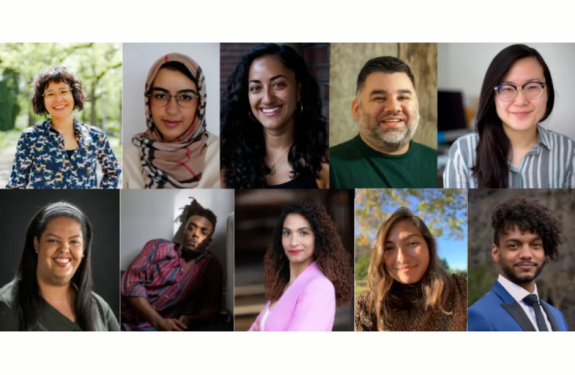
Journalists of Color
Support, mentorship and training are at the heart of the Journalists of Color Fellowship, a leadership program designed to strengthen solutions journalism support for equity in the news industry. Between Jan - Sep 2023, ten fellows received one-on-one coaching on real-time leadership challenges, forged peer-to-peer connections with journalism colleagues and engaged in in-depth conversations and a range of experiential activities. A Summer Speaker Series featured editors from leading publications, including private conversations about pay equity and other challenges journalists of color face.The fellows became accredited trainers through SJN’s Train-The-Trainers program and can now teach others the solutions framework and how to apply it to their practice. Six months into the fellowship, 90% of fellows reported that they felt more prepared to lead or enter leadership and 60% of the cohort received professional recognition and awards, and 20% received a significant offer for professional advancement.
Health Equity
Centering communities in reporting on responses to social issues was the goal of the 2023 Health Equity Initiative. Five U.S. newsrooms reimagined the way they covered public health and engaged with their audiences, producing in-depth stories through a solutions lens, integrating solutions journalism into their workflow, and centering communities of color in their coverage. The Emancipator, a digital magazine, explored systematic barriers to health and well-being in marginalized communities, complementing a three-part series focused on home ownership, community and institutions with health equity tours and a capstone community event on breastfeeding. At the Los Angeles Times, a series on mental health that explored how stigma plays out in different communities of color included interviews with people never previously quoted in the paper, said Jaclyn Cosgrove, editorial lead on the project. Another Times story is being translated into Japanese, making it the first Japanese-language mental health story in SJN’s Solutions Story Tracker®.

Building a Safe Space for Black Moms
Culminating a yearlong project on health equity that featured a solutions story on a Boston hospital helping breastfeeding Black mothers and their babies, The Emancipator organized “Breastfeeding While Black.” The daylong community event brought new and expectant mothers together with doulas, lactation consultants and doctors. All shared experiences, challenges and ideas in a forum that garnered trust and created a sense of belonging. One mother, Laura, called it a “beautiful and nourishing circle — friendly, safe space.” Jennifer Obasohan, another mother in attendance, said, “I’m just so glad that today’s event was able to take place, because there is a village, there is support out there.”
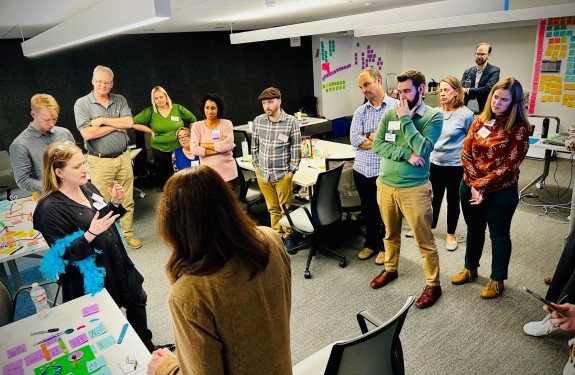
Revenue Beacons
One critical piece of the local journalism sustainability puzzle is improving the news experience to attract a bigger audience and more revenue. Solutions journalism can be key, according to a growing body of research suggesting it as an antidote to news fatigue. In late 2023, SJN partnered with five newsrooms to design and prototype new approaches to raising revenue tied to their solutions coverage. Guided by experienced coaches — and drawing on design-thinking principles — these newsrooms are putting community service at the core of their projects, and producing resources, events and journalism around issues such as arts funding, health access, education, climate and agriculture sustainability. To support this boundary-pushing work, they are seeking sponsorships from local businesses and foundations — and, in one case, from their audience as a whole.
Pictured: Members of the Revenue Beacon Cohort attend the kickoff design session in Dallas in November 2023.


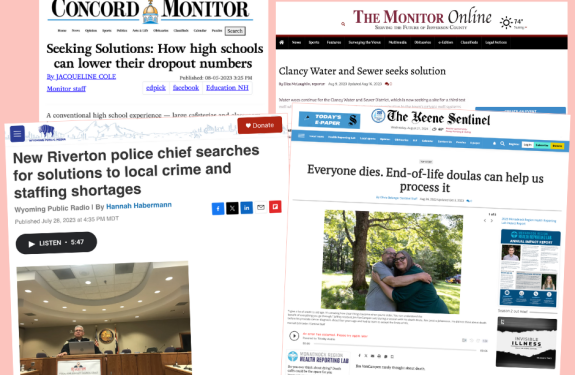
Rural
“It just makes us better reporters.” That observation came from Jodi Rave Spotted Bear, founder and director of the nonprofit Indigenous Media Freedom Alliance and editor of its news site, Buffalo’s Fire, who participated in SJN’s first Rural Cohort. Launched in mid-2023, it consisted of six newsrooms that worked together to make solutions journalism a regular part of ongoing coverage. These newsrooms have small staffs covering large areas, and limited time for big projects. Short, beat-focused solutions stories were a top priority. Over seven months, reporters and editors looked for solutions angles to stories they would already be covering. The newsrooms also made a commitment to solutions coverage as part of everyone’s work through the course of the cohort and beyond. “We’ve got more people — really everyone — thinking about solutions angles,” said Jack Rooney, managing editor for audience development at The Keene Sentinel.
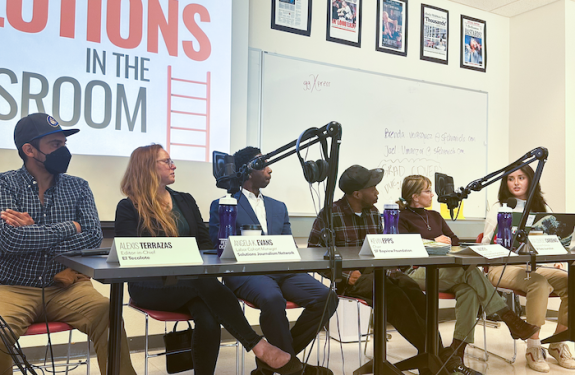
Labor
The 10 newsrooms in SJN’s Labor Cohort examined responses to systemic labor issues that are helping advance more equitable practices. Additional resources produced by cohort participants include a toolkit on LGBTQ+ sourcing in local news coverage and a guide to “How to become a listening newsroom.” Fellows led solutions-focused trainings for high school and college students and for local TV reporters. Gambit, an alternative newspaper in New Orleans, hosted “Solutions on the Half Shell,” a public celebration of reporting on how Indigenous fishermen working in the oyster industry are adapting to coastline erosion linked to climate change. In the week following the event, the publication saw its highest number of new membership sign-ups to date.
Pictured: Journalists in the Labor Cohort and Angela K. Evans, then SJN’s labor cohort manager (now climate network manager), speak on a panel at SF State in April 2023.

A Historic Black Paper Rekindled Relationships and Revenue
In April 2023, New York City’s Black-owned Amsterdam News published “Hard Labor,” a solutions-oriented series on labor relations in the city, with a focus on the construction trades. The paper’s union-sponsored Labor Awards Breakfast celebrated both the series and the organized labor community and rekindled relationships, with one sponsor more than doubling its financial support. The coverage also led to an increase in subscriptions. The newspaper’s president and chief revenue officer, Siobhan "Sam" Bennett, said: “The labor community was appreciative not only of the special section but also of the breakfast, which gave construction trades leaders the opportunity to speak to today's critical and underaddressed issues."
Global Network of Trainers
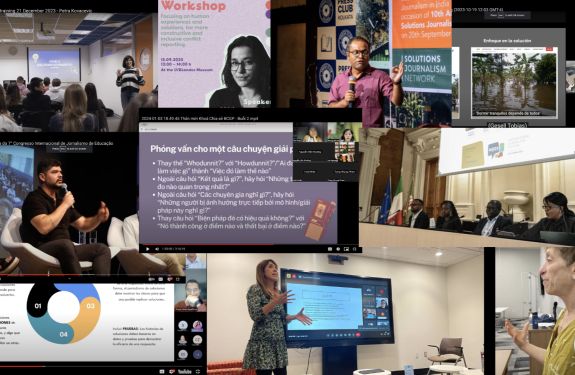
In 2023, SJN accredited 37 individuals through its Train-the-Trainers program, increasing the number of accredited trainers to 101 in 48 countries. These individuals then designed and led more than 180 solutions journalism training sessions for newsrooms and journalism organizations, preparing well over 1,000 people across the U.S. and worldwide to bring a solutions lens to their stories, and exponentially expanding the reach of the approach.
Trainings were led by these editors, reporters, educators, journalism researchers and nonprofit officers for organizations including, among many others: Voice of America, Thomson Reuters Foundation, The Narwhal in Canada, Nigeria Health Watch, Deutsche Welle in Germany, The Indonesian Association for Media Development, the Constructive Network of Italy, and the Walkley Foundation in Australia.
Map of Accredited Solutions Journalism Trainers
Raising Awareness Through a Massive Global Online Course
In the spring of 2023, the Knight Center for Journalism in the Americas, the world leader in massive open online courses (MOOCs) in journalism, hosted “Solutions journalism: New ways of elevating your reporting and engaging audiences.” The free, four-module training drew nearly 2,500 students from 137 countries. It was led by Hugo Balta, publisher of Illinois Latino News, and taught by four SJN-accredited solutions journalism trainers from the U.S., Singapore, Nigeria and India.
This Free Newsletter Course Keeps Solutions Journalism Top of Mind
“If you introduce solutions journalism to your newsroom, how do you make sure that it doesn't just become the shiny new thing that later falls by the wayside?” That was the question posed by Emma Löfgren, a longtime solutions journalism practitioner who is deputy managing editor of The Local, a European digital publication, and editor of The Local Sweden. Her simple answer: a steady diet of useful information. So Löfgren produced a seven-week email course for The Fix, which serves the European media market, featuring clear, simple tips “for making your newsroom more solutions-focused, winning over skeptics and keeping your closest allies on the right track."
Institutional Training Partners
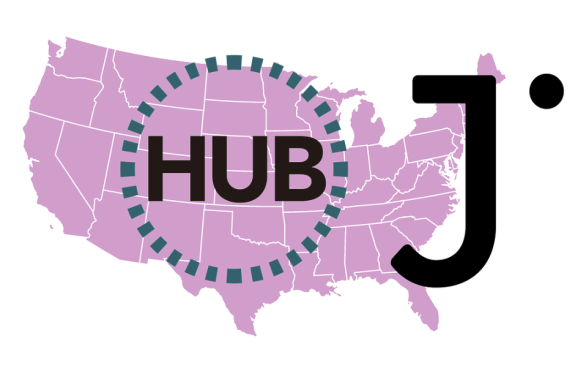
Journalism School Hubs
Four journalism school programs geographically distributed around the U.S. are designated as Solutions Journalism Hubs. All are committed to incorporating solutions journalism into their course offerings, and several offer trainings that include news outlets on campus as well as professional news organizations within their region. Stony Brook University offers a graduate-level seminar in solutions journalism, and the school’s NPR affiliate, WSHU, is a national leader in solutions journalism for radio. The University of Georgia’s Grady College weaves solutions journalism into broadcast, digital and news literacy courses, and at Northwestern’s Medill, plans are underway for a regional convening celebrating excellence in solutions journalism. Arizona State University is in the process of developing a study abroad course with a focus on solutions journalism.
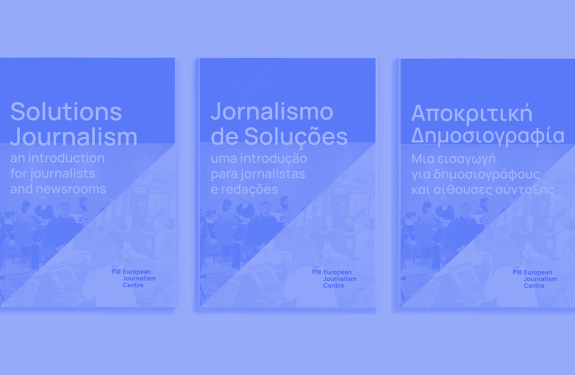
European Journalism Centre
In 2023, the European Journalism Centre (EJC), in partnership with SJN, continued to deepen its commitment to solutions journalism. As part of its second Solutions Journalism Accelerator, newsroom grantees and ambassadors in France, Germany and the UK published solutions journalism stories and learned how to engage their audiences with this work. Two guides released by EJC — Solutions journalism: An introduction for journalists and newsrooms and Solutions Journalism: 11 tough questions on how to do solutions journalism — had the most downloads of any in the center’s history. And the newly launched EJC Climate Journalism Award features a solutions journalism-focused category.
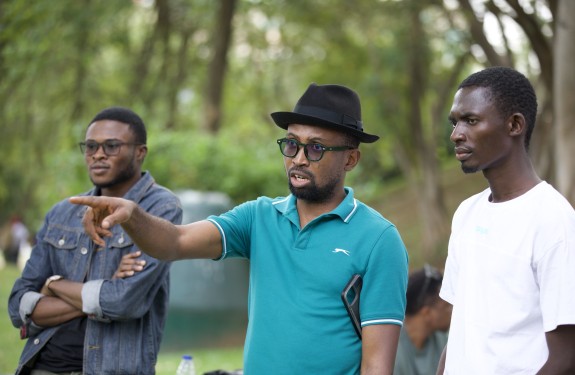
Africa Initiative
In 2023, the videos “An Extra Mile”: How Science Africa helped bring solutions journalism to Kenya and beyond and How Nigeria Health Watch helped bring solutions journalism to Nigeria (and beyond) showcased the strides made by both news outlets and scores of other newsrooms, laying the foundation for a sustainable solutions journalism practice across sub-Saharan Africa. As partners in the Solutions Journalism Africa Initiative since 2020, Science Africa and Nigeria Health Watch were among the first newsrooms in Africa to consistently incorporate solutions journalism into their reporting. All told, more than 60 newsrooms have participated in a range of initiatives, increasing solutions-focused coverage of health and development issues, creating multilingual resources for journalists, and generating revenue tied to solutions journalism. In 2025, the work will expand to include university partners offering solutions journalism modules and courses; an educator network; solutions journalism hubs; solutions journalism student clubs; and a Student Media Challenge modeled after the initiative in the U.S.
Pictured: Chibuike Alagboso of Nigeria Health Watch speaks with journalists in Lagos, Nigeria, during a 10-year Solutions Journalism Network anniversary party.

Solutions Reporting Energized a Newsroom’s WhatsApp
The community response to solutions stories has been so positive at The Citizen Bulletin, a hyperlocal digital outlet in Bulawayo, Zimbabwe, that staff members are reluctant to post problem-focused stories, according to Divine Dube, editorial director. Following the publication of stories such as “Gwanda Women Revolutionise Diaper Disposal With Eco-Conscious Solution” and “Home-made Sanitary Ware Empowers Girls To Stay in School,” The Bulletin’s WhatsApp community has seen steady growth, more dynamic discussions and “lively debates, invigorating our reporters with fresh perspectives and story ideas for future reporting endeavors,” said Dube.
An Emphasis on Solutions Journalism Helped Secure Two Major Grants
Prime Progress, a Nigerian digital publication focused on social impact and accountability, was founded by Innocent Eteng during his 2021 SJN LEDE Fellowship. By emphasizing its solutions journalism reporting, Prime Progress has raised $50,000 from the Media Development Investment Fund’s Nigeria Media Innovation Program and $20,000 from the Center for Religion and Civic Culture at the University of Southern California. The latter grant will fund a writer training fellowship and project dedicated to “stories about how people are responding to social problems based on faith and spiritual convictions,” which began in 2024.
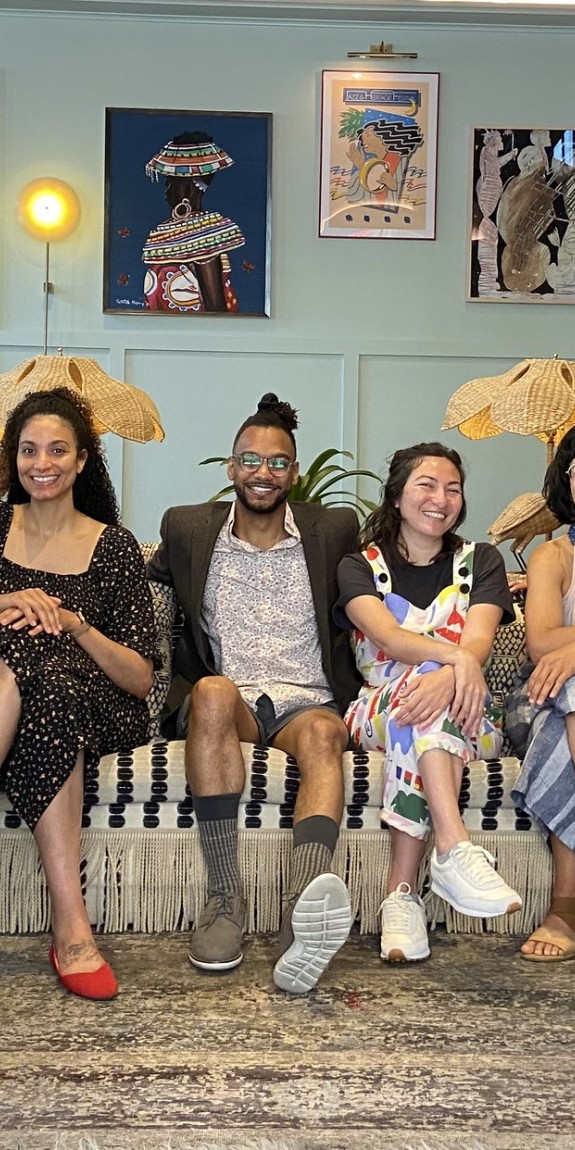
Pictured above: Journalists of Color Fellows gather in New Orleans in June 2023, alongside Ashley Hopkinson, then manager of SJN’s journalists of color and health equity initiatives (now manager of the Solutions Insights Lab), and Jenn Thompson, formerly SJN’s people and culture associate.
